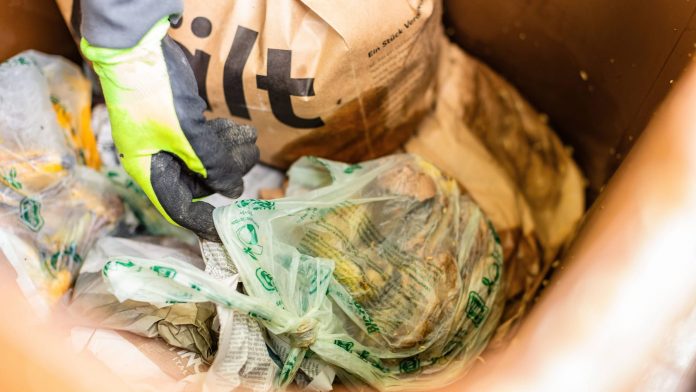There is too much non-compostable waste in Germany's organic waste bins. To change that, a new law will soon come into effect.
Collecting organic waste separately is good for several reasons: The organic residue can be converted into biogas or compost, for example, which in turn is the source of fuel or fertilizer. The potential is considerable: According to the Ministry of the Environment (BMUV), they make up 30 to 40 percent of all waste.
But there is a problem. Because organic waste often contains unusable materials, so-called mis-throws. The most common are glass, plastic, baby diapers or fecal cat litter. If the proportion in a batch is too high, all of the organic waste must be burned. This is not only harmful to the environment, but also expensive.
From May 1, 2025, a law should provide a remedy. More precisely, the so-called “small” amendment to the Organic Waste Ordinance from 2022 is to be expanded. Sanctions await citizens who, in addition to organic waste, also throw foreign substances into the organic waste bin. In addition to fines of up to 2,500 euros, there are other “unpleasant” obligations.
What does the new regulation mean for consumers?
The new regulation will initially have a direct impact on waste disposal and composting companies. They are the ones who would violate the new law if there were too many false throws. They are therefore allowed to reject organic waste with more than three percent foreign matter content.
Embed
This can be done by checking the organic waste bins more closely and more frequently in the future, for example by randomly “sifting” them. The waste disposal companies can also use special detector vehicles that can detect tons of metal or plastic. Contaminated bins are then marked with a sticker and not emptied.
For owners of organic waste bins, this means: the bin remains standing. Those affected then not only have to endure the strong smell of their organic waste, but also have to take care of the disposal themselves – and that can be expensive.
What fines are threatened?
However, each municipality determines how much you have to pay for the administrative offense as part of the catalog of fines. The circular economy law, which also deals with organic waste, provides for fines of up to 2,500 euros for major violations.
From a legal point of view, the question that must first be clarified in each individual case is whether it is a gross violation, writes “Myhomebook”. In this respect, fines will probably generally be less than 2,500 euros. But they would definitely be annoying. And leaving the full organic waste bin standing, especially in the summer months, is almost punishment enough.
What is allowed in the organic waste bin and what is not?
According to the BMUV, what can and cannot end up in the organic waste bin is not uniformly regulated nationwide, but rather at a local level. The local public waste disposal provider, i.e. the garbage collector, has the say on this point. The background is the various recycling options. The “wirfürbio” association has created a generally valid list.
This can go in the organic waste bin:
- Vegetable leftovers, salad leftovers, fruit (including tropical fruits),
- Leftovers, cooked and raw,
- Fish, meat, food leftovers (including spoiled ones),
- coffee grounds, tea, tearable coffee filters and tea bags,
- Leftover bread, baked goods, other flour products,
- dairy products (not liquid),
- nutshells, eggshells,
- Potted and cut flowers (without pot, binding wire or similar),
- Lawn cuttings, tree, shrub and hedge cuttings, leaves/needles, crop residues,
- Fallen fruit, flower and plant remains, diseased plants, weeds and moss,
- Small animal litter (only shavings, sand), straw,
- Kitchen roll, organic waste bags (made of paper), newspaper (not glossy paper)
This is not allowed in the organic waste bin:
- packaged foods,
- waste bags, plastic bags,
- Coffee, espresso, tea capsules,
- Dog waste bags, cling film, organic waste bags,
- Organic disposable tableware and bowls, organic disposable cutlery,
- Diapers, sanitary napkins, tampons, cosmetic items,
- Building rubble, excavated soil, street sweepings, stones,
- cooking oil, frying fat,
- jars with leftover food,
- medicine bottles,
- Plastic packaging,
- metal, composites


